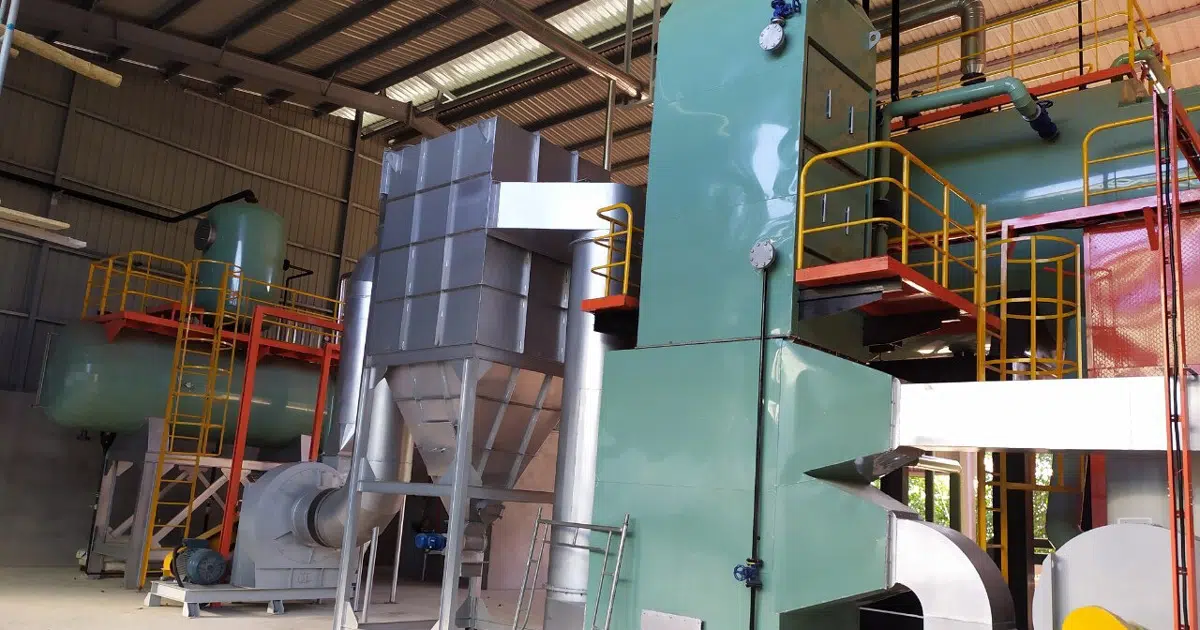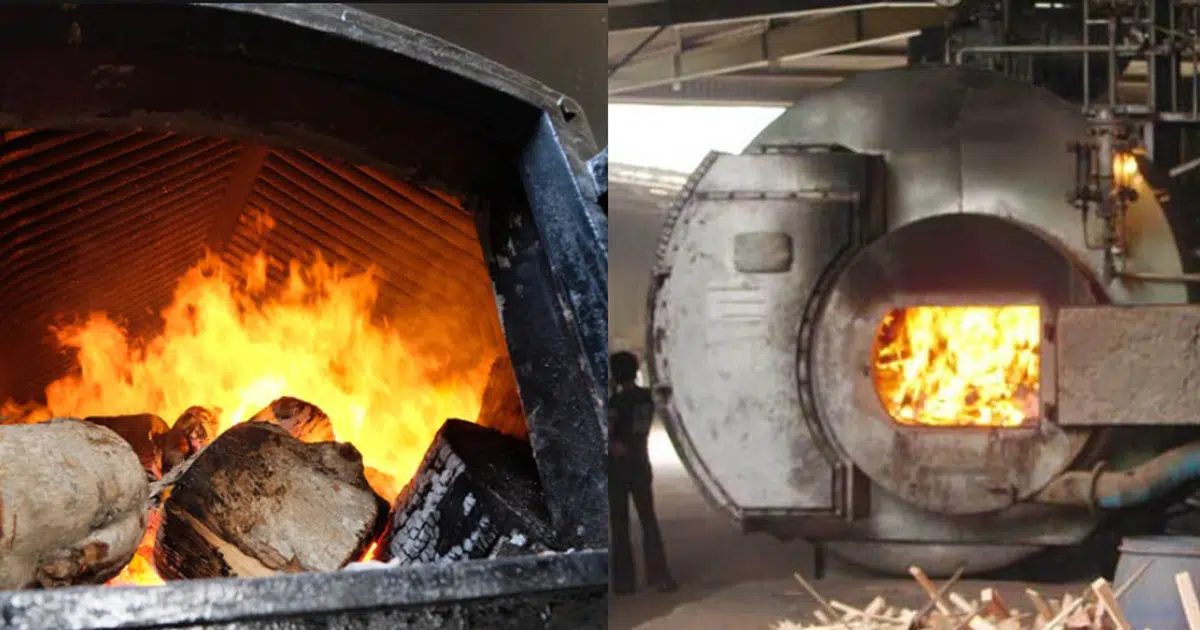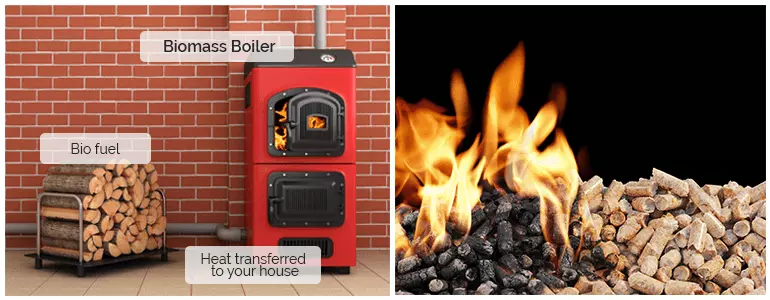
L'aggiunta di sale alle caldaie industriali aumenta il punto di ebollizione. L'articolo copre l'aggiunta sicura, misurazione accurata, e miglioramento dell'efficienza.
Hai qualche domanda?
L'acqua bollente è un processo fondamentale sia nella cottura quotidiana che nelle varie applicazioni industriali. Una convinzione comune suggerisce che l'aggiunta di sale all'acqua può farlo bollire più velocemente. Questo articolo esplora questa affermazione nel contesto di caldaie industriali e fornisce consigli pratici sull'uso in modo sicuro ed efficace in questi sistemi.
 Caldaia a vapore a legna
Caldaia a vapore a legna
Consultare le linee guida del produttore: Prima di aggiungere eventuali sostanze alla caldaia a vapore, Consultare sempre le linee guida del produttore per garantire la compatibilità e la sicurezza.
Misura la quantità appropriata di sale: Utilizzare misurazioni precise per evitare il sovra-salto, che può portare a corrosione o ridimensionamento. In genere, Si consiglia una quantità controllata e minima.
Dissolvere il sale in acqua: Pre-dissere il sale in una piccola quantità di acqua prima di aggiungerlo alla caldaia. Questo aiuta a distribuire uniformemente il sale ed evitare il ciuffo.
Aggiungi gradualmente la soluzione salina: Aggiungi lentamente la soluzione salina all'acqua della caldaia per prevenire improvvise reazioni chimiche che potrebbero influire sul funzionamento della caldaia.
Monitorare i parametri della caldaia: Dopo aver aggiunto sale, monitorare continuamente i parametri della caldaia, come la pressione, temperatura, e livelli di acqua, Per garantire un funzionamento stabile.
Una misurazione accurata è cruciale quando si aggiunge sale alla caldaia. Usa una scala digitale per pesare il sale con precisione. L'importo varierà a seconda della capacità della caldaia e dell'effetto desiderato. Per applicazioni industriali, La concentrazione è in genere mantenuta bassa per evitare effetti avversi sul materiale della caldaia.
Mentre l'aggiunta di sale all'acqua non accelera il processo di ebollizione, Può aiutare in altri modi:
Prevenire la formazione della scala: Il sale può aiutare a ridurre la formazione di scala nella caldaia, che può migliorare l'efficienza del trasferimento di calore.
Controllo della corrosione: Alcuni sali possono aiutare a controllare il livello di pH dell'acqua, prevenendo così la corrosione.
Efficienza di manutenzione: I livelli di sale gestiti correttamente possono prolungare la durata della caldaia riducendo la frequenza di mantenimento.
Controlli regolari: Controlla continuamente i livelli dell'acqua per assicurarsi che rientrino nell'intervallo raccomandato.
Sistemi automatizzati: Utilizzare sistemi di monitoraggio del livello dell'acqua automatizzato per mantenere livelli ottimali ed evitare errori manuali.
Aggiunte di equilibrio: Assicurarsi che l'aggiunta di sale non alzi drasticamente i livelli dell'acqua o l'equilibrio chimico.
Elevazione del punto di ebollizione: Comprendi che l'aggiunta di sale aumenta il punto di ebollizione dell'acqua, Significa che ci vuole più tempo per bollire.
Rischi di corrosione: Alte concentrazioni di sale possono accelerare la corrosione, Quindi è importante aggiungere sale con cautela.
Tipo di caldaia: Diverse caldaie possono rispondere in modo diverso al sale; Considera sempre il tipo e il modello specifici della tua caldaia.
Sta aggiungendo sale la chiave per l'acqua bollente più veloce in una caldaia a vapore?
NO, L'aggiunta di sale non è la chiave per ebollizione più veloce. Infatti, Solleva il punto di ebollizione dell'acqua, Richiedere più energia e tempo per raggiungere l'ebollizione.
Il sale farà davvero bollire l'acqua della caldaia?
NO, Il sale non farà bollire l'acqua della caldaia più veloce. Aumenterà il punto di ebollizione, potenzialmente rendendo il processo più lento.
Il sale può avere un impatto sulla velocità di ebollizione dell'acqua della caldaia?
SÌ, ma non nel modo in cui potresti aspettarti. Il sale solleva il punto di ebollizione dell'acqua, Ciò significa che può effettivamente rallentare la velocità di ebollizione.
Dovresti prendere in considerazione l'aggiunta di sale alla caldaia a vapore per un ebollizione più veloce?
NO, L'aggiunta di sale ai fini dell'ebollizione più rapida è inefficace. I motivi principali per l'aggiunta di sale all'acqua della caldaia dovrebbero essere correlati alla manutenzione e all'efficienza, non velocità.
Che effetto ha il sale sul punto di ebollizione dell'acqua della caldaia?
Il sale solleva il punto di ebollizione dell'acqua a causa del fenomeno noto come elevazione del punto di ebollizione. Ciò richiede che l'acqua raggiunga una temperatura più alta prima che bolle.

Costo caldaia a biomassa
Accelera bollendo: Errato; Solleva il punto di ebollizione.
Migliora il trasferimento di calore: Parzialmente vero, ma specifico per il contesto.
Sicuro per tutte le caldaie: Non sempre; Consultare le linee guida.
Necessario per tutti i sistemi: Dipende dal tipo di caldaia.
Impedisce tutta la corrosione: Solo alcuni tipi e condizioni.
Aumenta l'efficienza universalmente: Non una dichiarazione generale.
Può essere aggiunto in qualsiasi momento: I tempi e il metodo sono cruciali.
Elimina le esigenze di manutenzione: Si riduce, ma non elimina.
Non c'è bisogno di monitoraggio: Il monitoraggio continuo è essenziale.
Funziona con tutti i tipi di acqua: Dipende dalla chimica dell'acqua.
Impedisce la formazione della scala
Controlla la corrosione
Migliora l'efficienza del trasferimento di calore
Riduce la frequenza di manutenzione
Mantiene l'equilibrio del pH
Dovrebbe: Impedisce la formazione della scala.
Dovrebbe: Aiuta a controllare la corrosione.
Dovrebbe: Migliora l'efficienza del trasferimento di calore.
Dovrebbe: Mantiene la chimica dell'acqua.
Non dovrebbe: Può aumentare il punto di ebollizione.
Non dovrebbe: Rischio di sovra-salto e corrosione.
Non dovrebbe: Può richiedere più energia per l'ebollizione.
Non dovrebbe: Non è adatto a tutti i tipi di caldaia.
Fare: Consultare le linee guida del produttore.
Fare: Misura accuratamente.
Fare: Monitorare i parametri della caldaia.
Non: Aggiungi troppo sale contemporaneamente.
Non: Ignora i cambiamenti nel comportamento della caldaia.
Non: Usa il sale come soluzione rapida per problemi di efficienza.
Tipo di caldaia
Linee guida del produttore
Chimica dell'acqua
Concentrazione di sale
Precisione di misurazione
Processo di dissoluzione
Metodo di addizione
Sistemi di monitoraggio
Cambia punto di ebollizione
Rischi di corrosione
Prevenzione della formazione della scala
Efficienza di trasferimento del calore
Requisiti di manutenzione
Consumo di energia
Efficienza complessiva
L'aggiunta di sale all'acqua influisce sul suo punto di ebollizione a causa della proprietà coligativa nota come elevazione del punto di ebollizione. Quando il sale si dissolve in acqua, Si dissocia negli ioni, che interrompono la formazione di bolle di vapore necessarie per l'ebollizione. Questa interruzione solleva il punto di ebollizione, Significa che l'acqua richiede più energia termica per iniziare a bollire.
Nelle caldaie industriali, Lo scopo principale di aggiungere sale non è accelerare l'ebollizione ma la gestione della chimica dell'acqua e prevenire la formazione della scala e la corrosione. L'impatto pratico del sale sul tempo di ebollizione è minimo e spesso compensato dai benefici del miglioramento della manutenzione della caldaia.
Nonostante il mito comune, L'aggiunta di sale all'acqua della caldaia non accelera il processo di ebollizione. Invece, Solleva il punto di ebollizione e richiede più energia per raggiungere la fase di ebollizione. I vantaggi dell'aggiunta di sale risiedono nella sua capacità di gestire la chimica dell'acqua e migliorare la longevità della caldaia.
L'analisi completa rivela che l'aggiunta di sale all'acqua della caldaia ha diversi benefici, compresa la scala di prevenzione, Controllo della corrosione, e mantenimento di un efficiente trasferimento di calore. Tuttavia, È fondamentale aggiungere sale in quantità controllate e monitorare continuamente la caldaia per garantire prestazioni ottimali ed evitare effetti avversi.
Il mito che il sale accelera l'ebollizione viene sfatato da prove scientifiche che dimostrano che in realtà aumenta il punto di ebollizione. I veri vantaggi dell'aggiunta di sale si trovano nel miglioramento della manutenzione e dell'efficienza della caldaia, non nell'accelerare il processo di ebollizione. Una corretta comprensione e gestione del sale nell'acqua della caldaia può portare a operazioni di caldaia più efficaci e più durature.
L'affermazione che l'aggiunta di sale all'acqua lo fa bollire più velocemente è un mito. Nel contesto delle caldaie industriali, L'aggiunta di sale aumenta effettivamente il punto di ebollizione, richiede più energia per far bollire l'acqua. I principali vantaggi dell'aggiunta di sale all'acqua della caldaia comprendono la prevenzione della formazione della scala, Controllo della corrosione, e migliorare l'efficienza complessiva. Comprendendo e gestendo correttamente l'aggiunta di sale, Si può garantire prestazioni e longevità ottimali della caldaia.
L'aggiunta di sale all'acqua aumenta il punto di ebollizione, Significa che ci vuole più tempo per bollire. Nelle caldaie industriali, Gli effetti pratici del sale sono significativi per la manutenzione ma minimi per la velocità di ebollizione. Usa metodi come l'ottimizzazione della progettazione della caldaia, Aumento degli input di calore, e preriscaldare l'acqua per un'ebollizione più veloce. Questo articolo fornisce chiarezza sull'argomento e aiuta a migliorare l'efficienza nelle applicazioni industriali.
PREVENTIVI CALDAIE GRATUITI
Nessun ritardo, Ottenere 3 citazioni oggi Confronta per i migliori prezzi Sicuro e affidabileRECENSIONI
vVisualizza le recensioni dei nostri clienti
"Ho acquistato una caldaia a vapore Fangkuai per la mia fabbrica e funziona perfettamente da mesi ormai. La qualità dei materiali e la costruzione della caldaia sono impressionanti. È anche molto efficiente dal punto di vista energetico, che ci ha aiutato a risparmiare sulle nostre bollette energetiche. Consiglio vivamente i prodotti Fangkuai a chiunque necessiti di soluzioni di riscaldamento affidabili ed efficienti."
John
Stati Uniti d'America"La caldaia per l'acqua calda di Fangkuai è fantastica. Si riscalda in modo rapido ed efficiente, e l'acqua rimane calda per molto tempo. Non abbiamo mai avuto problemi e ha apportato un miglioramento significativo alle nostre operazioni quotidiane. Anche il processo di installazione è stato molto fluido e il servizio clienti è stato eccellente. Consiglio vivamente le caldaie ad acqua calda di Fangkuai."
Sara
Canada"I generatori di vapore di Fangkuai sono eccellenti. Sono molto facili da usare e richiedono una manutenzione minima. Anche il servizio clienti di Fangkuai è eccezionale. Sono molto reattivi e sempre disposti ad aiutare. Notevole anche l'efficienza energetica dei generatori di vapore, che mi ha aiutato a risparmiare sulle mie bollette energetiche. Consiglio vivamente i generatori di vapore di Fangkuai."
Maria
Spagna"Ho acquistato una caldaia a vapore Fangkuai per la mia fabbrica e funziona perfettamente da mesi ormai. La qualità dei materiali e la costruzione della caldaia sono impressionanti. È anche molto efficiente dal punto di vista energetico, che ci ha aiutato a risparmiare sulle nostre bollette energetiche. Consiglio vivamente i prodotti Fangkuai a chiunque necessiti di soluzioni di riscaldamento affidabili ed efficienti."
John
Stati Uniti d'America"Sono rimasto molto colpito dalla qualità della caldaia per l'acqua calda di Fangkuai. È costruito per durare e ha superato le mie aspettative. Anche il processo di installazione è stato molto fluido e il servizio clienti è stato eccellente. La caldaia per l'acqua calda è molto facile da usare e manutenere, e l'efficienza energetica è notevole. Consiglio vivamente le caldaie ad acqua calda di Fangkuai."
Jack
Australia"La caldaia a vapore di Fangkuai è perfetta per la mia attività di trasformazione alimentare. Soddisfa tutti i nostri requisiti ed è molto affidabile. La qualità dei materiali e la costruzione della caldaia sono eccezionali. È anche molto facile da usare e mantenere, che ci ha aiutato a risparmiare tempo e denaro per la manutenzione. Consiglio vivamente le caldaie a vapore di Fangkuai a chiunque necessiti di soluzioni di riscaldamento affidabili."
Json
Brasile"Il generatore di vapore di Fangkuai è perfetto per la mia piccola impresa. È molto facile da usare e richiede una manutenzione minima. È anche molto efficiente dal punto di vista energetico, che mi ha aiutato a risparmiare sulle mie bollette energetiche. Anche il servizio clienti di Fangkuai è eccellente. Sono molto reattivi e sempre disposti ad aiutare. Consiglio vivamente i generatori di vapore di Fangkuai."
Ahmad
Egitto"La caldaia per l'acqua calda di Fangkuai è fantastica. Si riscalda in modo rapido ed efficiente, e l'acqua rimane calda per molto tempo. Non abbiamo mai avuto problemi e ha apportato un miglioramento significativo alle nostre operazioni quotidiane. Anche il processo di installazione è stato molto fluido e il servizio clienti è stato eccellente. Consiglio vivamente le caldaie ad acqua calda di Fangkuai."
Sara
Canada"La caldaia a vapore di Fangkuai è perfetta per la mia attività di trasformazione alimentare. Soddisfa tutti i nostri requisiti ed è molto affidabile. La qualità dei materiali e la costruzione della caldaia sono eccezionali. È anche molto facile da usare e mantenere, che ci ha aiutato a risparmiare tempo e denaro per la manutenzione. Consiglio vivamente le caldaie a vapore di Fangkuai a chiunque necessiti di soluzioni di riscaldamento affidabili."
Json
Brasile